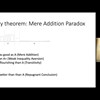accompanying
The ambivalence of desistance: Balancing in the liminal space between deviance and conventionality
European Journal of Criminology Abstract Building and expanding on contemporary research where desistance is increasingly conceived of asa fragile and liminal experience, this paper examines the early dof ambivalence – an undertheorised concept in life course criminology. This paper employs qualitativeinterviews from a total of 10 participants who participated in SIG, a voluntary defector programmein Sweden. Despite having formulated a clear resolve to desist, the participantsnonetheless experienced feelings of ambivalence in relation to the desistance process. In theseinstances, the aspiring desisters were bordering between the prospects of a better, crime-freelife and the pains, losses, struggles and frustrations accompanying the early stages of desistance.It is argued that this liminal position, where the old life is to be discarded and a new, better lifeis yet to be built, may constitute a breeding ground for ambivalence – a state which needs tobe grounded in the precarious social position of marginalised youth which aspiring desisters typicallyoccupy.
Research seminar with Krister Bykvist: Who should care about impossibility theorems in population ethics?
Online seminar. Register here > Research seminar with Krister Bykvist, Professor in Practical Philosophy at the Department of Philosophy, Stockholm University and Institute for Futures Studies. This se, New Jersey, USA.

Krister Bykvist: Who should care about impossibility theorems in population ethics?
Research seminar with Krister Bykvist, Professor in Practical Philosophy at the Department of Philosophy, Stockholm University and Institute for Futures Studies. This seminar was arranged by the Insti
Emergent hierarchical structures in multiadaptive games
2011. Phys. Rev. Lett. 106: 028702. We investigate a game-theoretic model of a social system where both the rules of the game and the interaction structure are shaped by the behavior of the agents. We ca
False Choices: A Response to Michael Ignatieff's The Ordinary Virtues
King's Law Journal 30, 356-362 Abstract Part political journalism, travel memoir, political theory, sociology, anthropology, and moral psychology, Michael Ignatieff’s The Ordinary Virtues defies easy de
Moulding Parents’ Childcare? A Comparative Analysis of Paid Work and Time with Children in Different Family Policy Models
Pp. 207-230 in Drobnic, S. and Guillén, A. (eds.) M. Work-Life Balance in Europe – The Role of Job Quality Palgrave Publishers Ltd. Abstract We analyze the relationships between parents’ paid work and act
Subsistence Emissions and Climate Justice
British Journal of Political Science Abstract The climate justice literature typically endorses a moral right to produce subsistence emissions, but this right appears problematic considering how urgent
Violent threats and internal security - findings from a Canada-Sweden research project
The Embassy of Canada, in partnership with the Institute for Futures Studies (IFFS), would like to invite you to a seminar presenting the Canada-Sweden collaborative research project on violent threat Thursday 19 January 2023, 15:30-18:00 Embassy of Canada to Sweden, Raoul Wallenberg room, 7th floor, Klarabergsgatan 23, Stockholm
Rethinking society for the 21st century
A couple of weeks ago it was decided that the Institute for Futures Studies will support the project International Panel on Social Progress. It is a large project with high ambitions that mobilizes se








